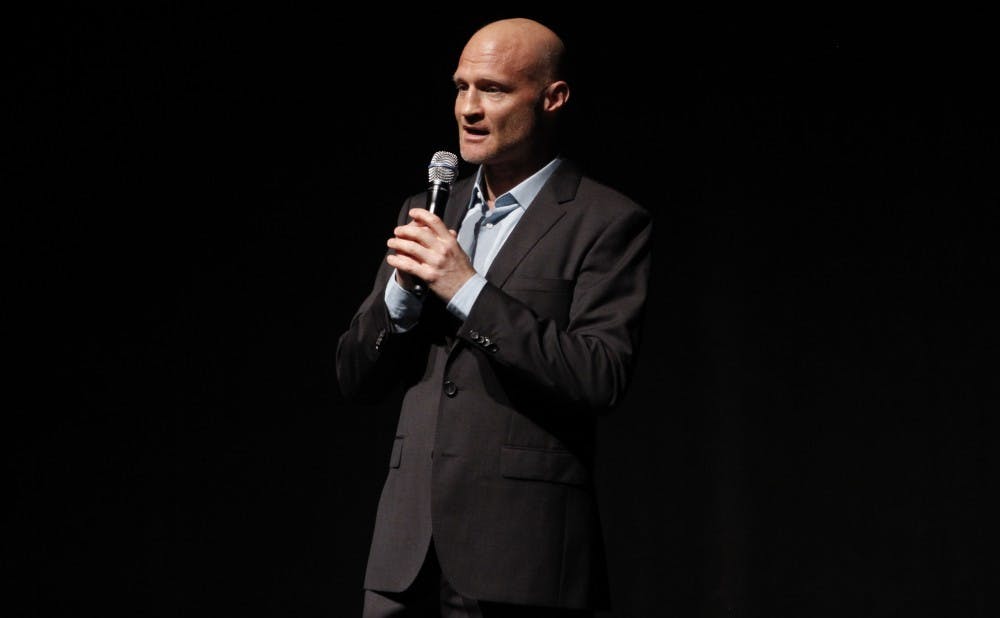The Onion has its roots in some very human experiences, from undergoing a rough financial start to experiencing the rise of the Internet, revealed Scott Dikkers in a talk Monday.
Dikkers, co-founder and former editor-in-chief of The Onion, gave a talk called "The Funny Story Behind the Funny Stories" in Page Auditorium, detailing his experiences from childhood to adulthood in getting into the comedy business, often generalizing his life stories into pieces of advice for the audience. The talk was sponsored by the Duke Program in American Values and Institutions and co-sponsored by several other student groups and academic departments.
Dikkers began the talk on a serious note. He described his childhood as bleak and recalled being bullied by classmates. When he was in third grade, he decided to commit suicide, Dikkers said, though he was quick to break the tension in the audience and point out the humor in the situation.
"Here was my strategy," Dikkers said. "I stuck myself in my bedroom. I sat on my bed and held my breath as long as I could."
Dikkers' unconventional anecdotes consistently evoked laughter from the audience. He explained his early hiring process, in which The Onion searched for loners and minimum wage workers instead of the most obvious talents.
"These were our A-players," Dikkers explained. "Because they were bitter, they were smart—like too smart for college and they had no prospects in life."
Dikkers also addressed the many lawsuits that The Onion narrowly escaped, largely due to the help of their attorney at the time. Even when facing a lawyer representing an unnamed—due to confidentiality agreements—but famous pop star, The Onion survived.
"Ken [the lawyer] gets on the phone with this guy and after 15 minutes they're laughing sharing stories of their childhood," explained Dikkers. "The guy orders a subscription to The Onion—never hear from him again."
Despite the setbacks, Dikkers chronicled the solid growth that The Onion experienced. He spoke about transitioning from an informal print publication to strict newspaper satire that abided by Associated Press style—which The Onion continues to use today. But The Onion did not start building an online community and immersing itself in social media until 2012, he noted.
"We literally were just nose to the ground working on the paper, and we looked up one day and said 'what is this Facebook that everybody's talking about?'" Dikkers joked.
However, once The Onion had established its online presence, it began to receive exposure beyond the scope of the print publication.
Near the end of the talk, Dikkers concluded with several pieces of life advice built on his experiences. He told the audience to live their mission, invest their passion, be prepared to scrap everything, trust coworkers and work right.
Audience members appreciated the autobiographical narrative that Dikkers presented during the majority of the show.
"The first part where he was talking about what happened was so much cooler than any sort of moral advice, so I give him a thumbs up for that," said freshman Jackson Dellinger.
The talk also lead to students examining The Onion through a new perspective, with the context of the publication and the people behind it.
"It's really hard for people to consider comedy as a coping mechanism, but hearing [Dikkers'] talk today and realizing how important humor has been for him was really eye-opening," said freshman Zoey Kang. "While it's easy to just laugh and joke about what The Onion is, [Dikkers' talk] enabled me to see satire and parody in a whole new light."
Get The Chronicle straight to your inbox
Signup for our weekly newsletter. Cancel at any time.

